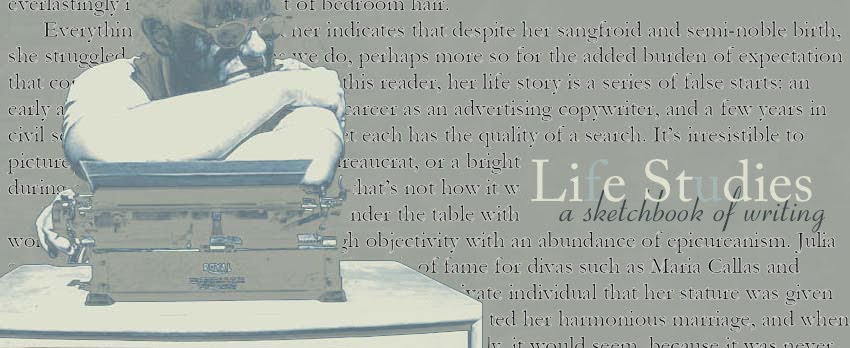Earlier, she had looked out the window and said "Guys, I have a guest room upstairs!" We were finishing some peppermint tea, hypnotized by the lusty flames in her Jotul.
Twice the plow passed in front of her house with its guttural run-on sentences—then disappeared. Her cats were asleep in individual foam beds.
It would be a long, slow drive home, and leaving—putting our boots on, going out into the weird night—had the quality of a big decision, like divorcing, or quitting a job.
The last words Robin said, one arm raised and pointing, were "Go that way." But she was standing in front of the door's light and I couldn't make out which arm she had raised.
I said "That way?" I knew she couldn't mean the shortcut.
The falling snow was like a thousand muted voices screaming.
"No!" Now we were like two people in a foreign country, without a common language. "Toward—the—post—office!"
I couldn't recognize anything in the altered landscape, and we almost missed our turn.
Out on Route 1, the snow-covered boughs of the Eastern White Pines—crowded up against the edge of the road—all pointed southwest, toward Ellsworth.
An approaching car was like the flashlights of a couple of boy scouts exploring a mammoth cave, magnified by the corridor of pines, coming from around a bend in the road ahead. After it passed, the ghoulish light of snow was everywhere, coming from nowhere in particular.
A single electric candle in the front window of a clapboard house threw an ocher rectangle on the lawn in front, and I could feel its sentiment like a single line of poetry, a sentence underlined in a book—a modest, perfectly-timed embrace.
The sky was low, and the vacant distances, the long views out across the bay, were blue-black holes. The Atlantic ocean was on our left—a deduction, a mere fact—as we drove, on the coast of Maine, in early April.
* * *
I had moved back to the land where my mother had grown up, and, three days before her birthday, again I tried to conjure her at 12. Her memories of Maine were a tiny part of her that hadn't been suffocated by Viceroys and Aqua Net. The nail of her right-hand ring finger, unpaintable, dull, still bore the marks of the apple press—or was it the root cellar door?—from when she was a girl, and there were stories of her father's pig that followed her around the door yard and the body they found under a dock up at Beech Hill Pond. There had been brown bread and finnan haddie and boiled dinner, and any lobster a restaurant dared serve my mother was "crayfish" compared to those of Maine.
Thus the state entered my early consciousness.
We made the long car trip up from Pennsylvania two or three times during my childhood, stopping over in Massachusetts for the night. My memories are dim.
One night the adults left me in the care of my uncle "Fod." He took me in his pick-up down to the riverfront and parked. He pulled a bottle out from underneath the driver's seat and made me promise not to tell Aunt Leah.
Now I know the woman who owns the big house across the river from that spot, but I didn't know anyone, then—fascinated by the cats that appeared and disappeared through tiny flapped doors in my aunt's kitchen wall, and the tales of my bachelor uncle who had been everywhere in the world. He watched me when I was 10, surmising how unhappy I would become as an adult.
But now the public buildings of the town, the choked-off road out to an abandoned fairground, and the old houses that squat like piles of driftwood on their overgrown lots keep their secrets. My mother is not here. No one is here anymore. And like an old dinner plate or a keepsake afghan, objects transmogrify into the present, forgetting or denying the past.
And I am myself, no longer my mother's child.
A little out of place.
* * *
It took us an hour to get home from Steuben, and as we walked the dogs the sky was low and opaque—Chekhovian. The trees, outlined in snow, and the tiny houses angled into the drifts composed a funny—but somehow ravishing—diorama. On the sidewalk ahead of me, Gary seemed far away, as if he had passed into another life, leaving me behind.
Indignantly, I re-read all of Pine Tree Weather's posts to see just how adequately we'd been advised of this storm. The colored bands of the precipitation maps looked like a card of paint chips.
But halfway through the report, a couple of sentences struck me as oddly poetic.
Typical with spring along the 45° parallel, there is a constant battle between winter and spring in April, and this year is no different. There is still plenty of cold to the north that is slowly retreating. The higher sun angle and length of daylight will continue to erode at the cold over time. It appears that this will be a slow process.
I hadn't expected the little shiver down the spine that comes in the presence of great art, and I sat quietly for a few moments in a sort of tribute to the forecaster-poet.
I located the 45° parallel, tracing it with my eyes across central Maine, exiting just above Grand Manan into the Bay of Fundy.
It has been a constant battle between winter and spring, between hoping and quitting, between obsession and lassitude.
And the snow that came late in the night—like a dreaded phone call, or a birth—fell on the living and the dead alike.
